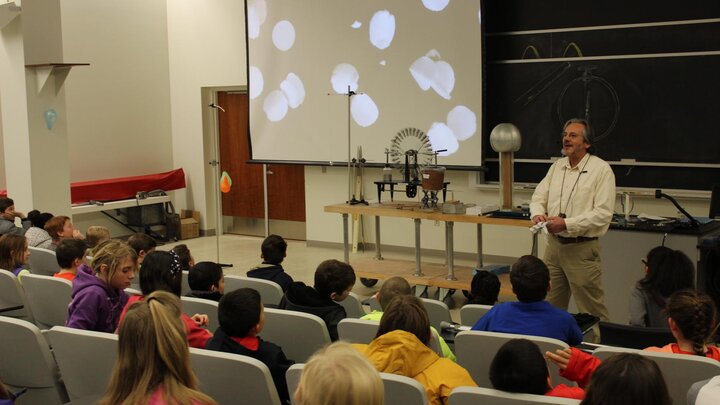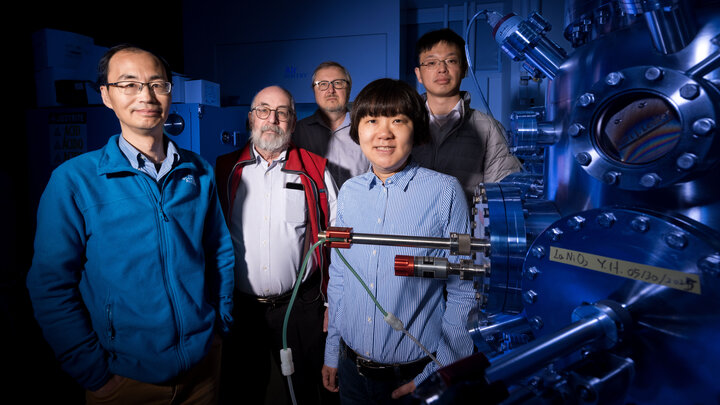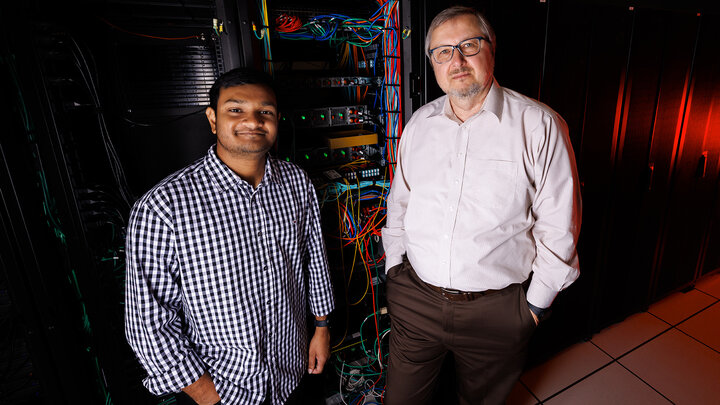A group of nearly 40 Lincoln Public Schools fifth graders sit forward in their chairs. A balloon sticks to the wall and the projector displays an image of an atom. Professor Dan Claes describes the basic makeup of the atom. "What charge does a proton have?" Claes asks. Students' arms shoot skyward, eager to answer his question. One student correctly answers that protons have a positive charge.
Local fifth graders gather every Saturday in February for Saturday Science, a partnership between LPS and the Department of Physics and Astronomy to help get students excited about basic physics principles. Department professors or graduate students teach a lecture and give demonstrations. Students then split up into lab groups and experiment with tools like balloons and magnets.
Each Saturday, Cliff Bettis fills the front of a Jorgensen Hall lecture room with lab equipment and historical scientific instruments. The students are greeted by a setup, this week the Ting-a-Ling Machine, designed by Bettis and built by the Department’s Instrument Shop.
"Saturday Science has been a wonderful partnership between the UNL Physics Department and Lincoln Public Schools for decades," says Bettis. "Its primary mission was to supplement young children's science education but it has had a wider impact. Many of our TAs go on to help with science fairs because of the connections they make at Saturday Science. We have interns in our department's summer program that came about through Saturday Science connections."
Grad student Shi Cao demonstrates how to create lab apparatus.For his lecture "Electricity and Magnetism," Claes demonstrates each concept with engaging examples. He shows static electricity by rubbing two balloons on his sleeve that then repel each other. The students' favorite demo involves charging copper buckets with a Wimshurst machine and discharging the top bucket with a discharge stick. They yell "Yeah!" when Claes asks them if they would like to see it one more time.
Saturday Science is a way for the Department to give back to the Lincoln community and inspire a new generation of researchers. The lessons reinforce the LPS curriculum. Students also take home devices they build during labs and continue their discovery beyond the classroom.
The other lectures for 2016 are "Tops and Things that Turn and Spin" by Cliff Bettis, "Sound and Music" by Marina Bradaric and Tina Riley, and "Light and Lasers" by Steve Ducharme.
Grad student Joshua Beck explains a magnet and paper plate experiment to students.Graduate students and postdoctoral researchers play a significant role in leading the breakout lab sections. Three groups rotate between the first-floor Jorgensen Hall laboratories and practice different scientific principles in each room. Assistants for 2016 are Karl Ahrendsen, Joshua Beck, Shi Cao, Paulo Costa, Prakash Giri, Guanhua Hao, Rabindra Nepal, Shashi Poddar, Matthew Robinson, and Jingfeng Song.
Karl Ahrendsen (pictured below) says that he volunteered for Saturday Science to help pass along scientific knowledge to children. He feels that the impacts of Saturday Science go beyond elementary school grades and standardized tests.
"A lot of the concepts that we talk about on Saturdays are the same concepts that we talk about with college students," says Ahrendsen. "Sometimes college students struggle with the ideas, so if these fifth graders are being exposed to these ideas at such an early age, they'll really have a head start on anybody else who doesn't attend such a workshop."
Grad student Karl Ahrendsen announces the next steps in the lab experiment.The students, of course, are the best part about Saturday Science.
"They all love the lectures that are given at the start of each session," says postdoctoral researcher Matthew Robinson. "Hopefully by the end of the day, they are able to leave, being able to say that they have had a good time, learned something new, and are just that little bit more curious about how the world works than when they first arrived."




